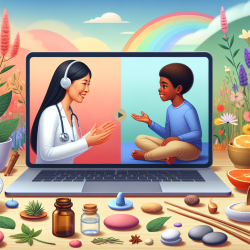Enhancing Therapy Outcomes Through Integrative Medicine: Insights from the Second Annual Integrative Medicine Symposium
In the ever-evolving landscape of healthcare, integrating complementary and alternative medicine (CAM) into traditional practices is becoming increasingly crucial. The Second Annual Integrative Medicine Symposium, held at UCLA, provided a wealth of knowledge and practical insights that can be transformative for practitioners, especially those in speech-language pathology and related fields.
This symposium emphasized the importance of translating scientific research into clinical practice, offering a blend of plenary presentations and hands-on workshops. The focus was on three major health concerns: cancer, functional disorders (such as irritable bowel syndrome and fibromyalgia), and metabolic syndrome (including obesity and diabetes). These sessions were tailored to equip practitioners with the necessary skills to integrate CAM therapies into their practice effectively.
Key Takeaways for Practitioners
The symposium highlighted several critical areas where practitioners can improve their skills and enhance patient outcomes:
- Integration of CAM Therapies: The symposium provided clinical case presentations that demonstrated the integration of CAM therapies. These real-world examples can guide practitioners in applying similar approaches in their practice, leading to improved patient outcomes.
- Evidence-Based Practice: Reviewing clinical evidence for CAM therapies was a focal point. Practitioners were encouraged to rely on data-driven decisions when recommending CAM therapies, ensuring that interventions are both safe and effective.
- Communication Skills: Developing effective communication strategies was emphasized to aid in counseling patients who seek or demand CAM therapies. This is particularly important in establishing a trusting patient-practitioner relationship.
Applying Insights to Speech-Language Pathology
For speech-language pathologists, integrating these insights can be particularly beneficial. Here’s how you can apply these findings to improve outcomes for children:
- Holistic Approach: Consider the whole child, not just their speech and language needs. Integrating CAM therapies, such as mindfulness or yoga, can support overall well-being and potentially enhance therapy outcomes.
- Interdisciplinary Collaboration: Work closely with other healthcare providers, such as nutritionists and psychologists, to provide comprehensive care that addresses all aspects of a child's health.
- Parent Education: Educate parents about the benefits and evidence supporting CAM therapies. This can empower them to make informed decisions about their child’s care.
Encouraging Further Research
The symposium underscored the importance of ongoing research in CAM. Practitioners are encouraged to stay informed about the latest findings and consider contributing to research efforts. By doing so, they can help build a robust evidence base that supports the integration of CAM into mainstream healthcare.
For those interested in delving deeper into the research presented at the symposium, the original research paper provides a comprehensive overview of the findings and discussions. To read the original research paper, please follow this link: Second Annual Integrative Medicine Symposium.










